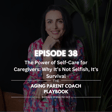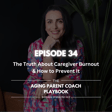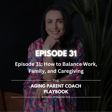Become a Creator today!Start creating today - Share your story with the world!
Start for free
00:00:00
00:00:01

Episode 24: How to Talk to Your Parent About Assisted Living
In this episode of The Aging Parent Playbook, Dr. Barbara Sparacino tackles one of the hardest conversations adult children face—talking to a parent about assisted living. She shares how to recognize when it’s time, how to approach the topic without triggering resistance, and what to do if your parent refuses. With empathy, timing, and the right language, this episode guides you through a compassionate and practical approach to help your parent maintain dignity and control during a difficult transition.
Transcript
Introduction to Assisted Living Discussion
00:00:02
Speaker
Welcome back to the Aging Parent Playbook. I'm Dr. Barbara Sparacino and today we're diving into one of the hardest conversations you'll ever have. Telling your parent it's time to consider assisted living.
00:00:13
Speaker
If you're dreading this talk, you're not alone. Maybe your parent is fiercely independent, in denial about their health, or flat out refusing to listen. You might be afraid of breaking their heart, damaging your relationship, or feeling like you're giving up on them.
Importance of Early Conversations
00:00:28
Speaker
But here's the truth. Having this conversation early before a crisis can actually lead to a better outcome for everyone. Waiting until an emergency forces your hand takes away their ability to make choices and it makes the transition even harder.
00:00:43
Speaker
So today we'll cover when to start the conversation and how to recognize the signs it's time. How to bring it out, how to bring it up without triggering defensiveness. What to do if your parent refuses to listen. This is a tough talk, but avoiding it won't make it easier.
00:00:59
Speaker
so Let's get into it.
Recognizing the Need for Assisted Living
00:01:01
Speaker
So how do you know it's time for assisted living? Most families wait until a crisis forces them to make a decision. An ER visit, a bad fall, a medical emergency. Suddenly you're scrambling to find care.
00:01:13
Speaker
Your parent is overwhelmed and emotions are running high. The best thing you can do start the conversation before you're in crisis mode. But how do you know when it's time? So let's talk about the biggest warning signs.
00:01:26
Speaker
Some red flags that it's time to consider assisted living are safety, safety concerns, frequent falls or bruises, forgetting to turn off the stove or lock the doors, wandering or getting lost in familiar places.
00:01:39
Speaker
If there's significant cognitive decline, memory lapses that impact daily living, missing doctor's appointment, forgetting meals, forgetting medication, getting confused with finances, late or unpaid bills, repeating the same questions multiple times a day.
00:01:54
Speaker
Also neglecting self-care. If you notice, weight loss or dehydration, wearing the same clothes for days, skipping medication, taking the wrong dose, also increased isolation, avoiding social events they once loved, drawing with family from family and friends, no longer keeping up with hobbies, and struggling with daily tasks, not cleaning their home, spoiled food in the fridge, struggling to cook, missing meals, trouble keeping up with laundry, bathing, and dressing. If you're seeing multiple signs,
00:02:23
Speaker
it's time to start the conversation. The sooner you begin, the more control and choices your parent will have over their next steps.
How to Initiate the Conversation
00:02:32
Speaker
So now you know it's time, but how do you have the talk without resistance? Now comes the hard part, figuring it up without triggering resistance. This is where most families go wrong.
00:02:42
Speaker
They start the conversation with, mom, with mom you can't live a alone anymore. Dad, we need to move you into assisted living. You're not safe here. You need to leave. You know, this approach feels like an attack and what happens?
00:02:54
Speaker
What happens when people are attacked? They shut down. I encourage instead use a more empathetic, gradual approach that invites them into the decision making process. So step one, start with empathy. Lead with concern, not control.
00:03:08
Speaker
For example, hey, I've noticed your you've been having a harder time keeping up with the house. How are you feeling about that? Ask open and ended questions. So what what worries you most about getting extra help?
00:03:20
Speaker
Step two, use gentle non-language. Avoid words like nursing home or facility. Instead, try a community where you'll have more support, a place where someone can take care of the cooking and cleaning for you.
00:03:33
Speaker
Highlight the positives. Wouldn't it be nice to have people around just with whom to socialize? Step three, give them some control. Let them tour facility. Ask for their input. Example, if you ever needed more help, what would be most important to you?
00:03:47
Speaker
Frame it as a trial run. Example, would you be open to trying it for a short stay and seeing how you feel? Because the more involved they feel, the smoother the transition will be.
Dealing with Parental Resistance
00:03:57
Speaker
Now, what to do if your parent refuses? So they even so what do we do if they even refuse even consider it?
00:04:05
Speaker
What if they shut down, change the subject, or get angry? Here's the key. This isn't a one-time conversation. It's a process. If they resist, don't force it, but don't drop it entirely either.
00:04:17
Speaker
How do we handle resistance? We don't push too hard. If they refuse, we back off and revisit later. You know, this is about planting the seed gradually. Bring it up in small doses over time.
00:04:27
Speaker
Try a short-term stay. Some facilities offer respite stay respite care stays for a few weeks to a month so they can experience the spirit without a long-term commitment. Also, get their doctor involved.
00:04:39
Speaker
You know, sometimes hearing it from a physician is more convincing. Contact the aging parent coach. I can help you with that. And most importantly, be patient. Fear of losing independence is real.
Empowering Parents in Decision-Making
00:04:49
Speaker
And it but and it's valid. And it takes time to accept change.
00:04:53
Speaker
And i and like I started this conversation. This is one of the hardest conversations you'll ever have. But avoiding it only makes it harder. Start early. Approach with with empathy. Start and give them a sense of control. And most of all, be patient with the process.
00:05:09
Speaker
If today's episode was helpful, please share it with someone who might need it And if you need guidance navigating these conversations, check out my coaching program for one-on-one support at theagingparentcoach.com.
00:05:21
Speaker
And next until next time, take care of yourself.



















